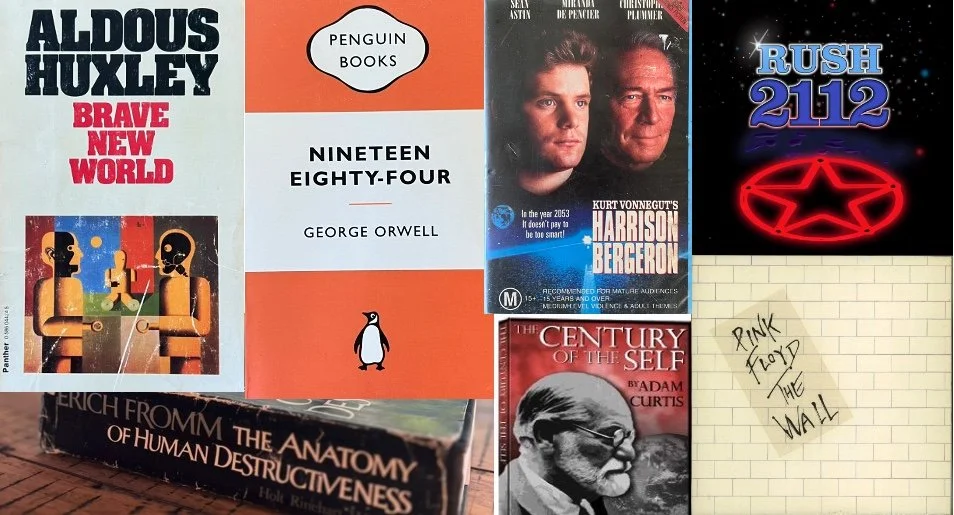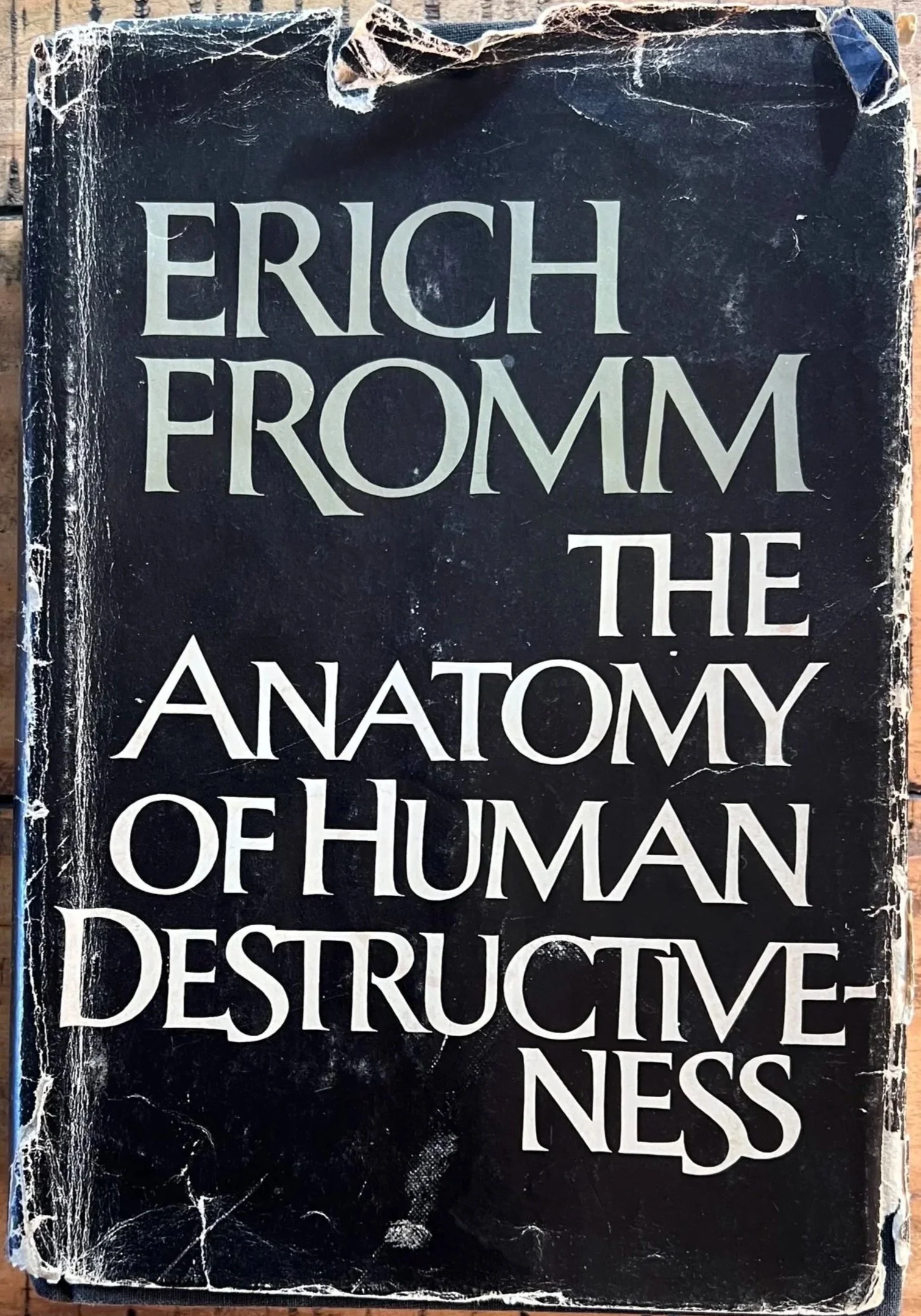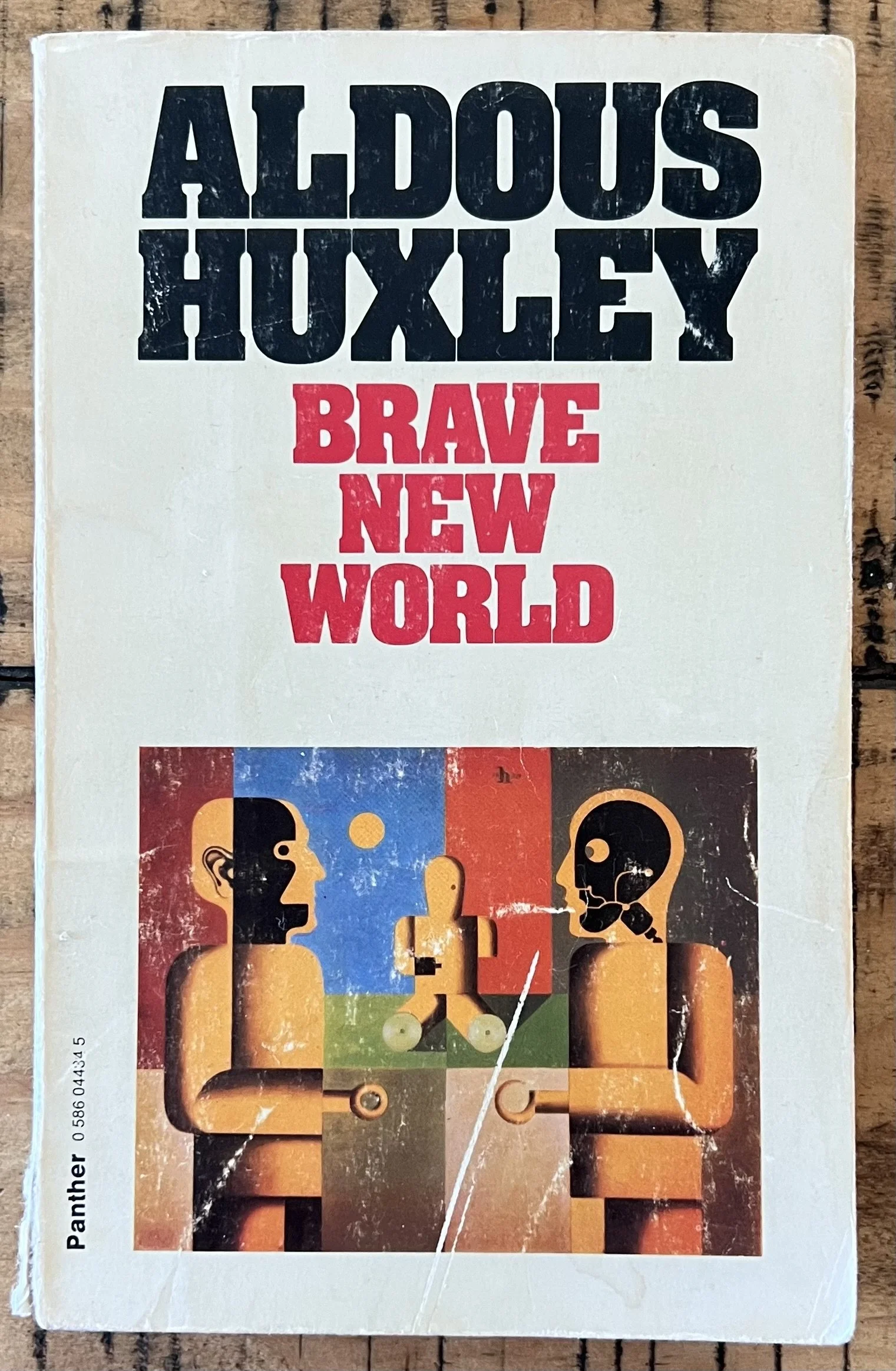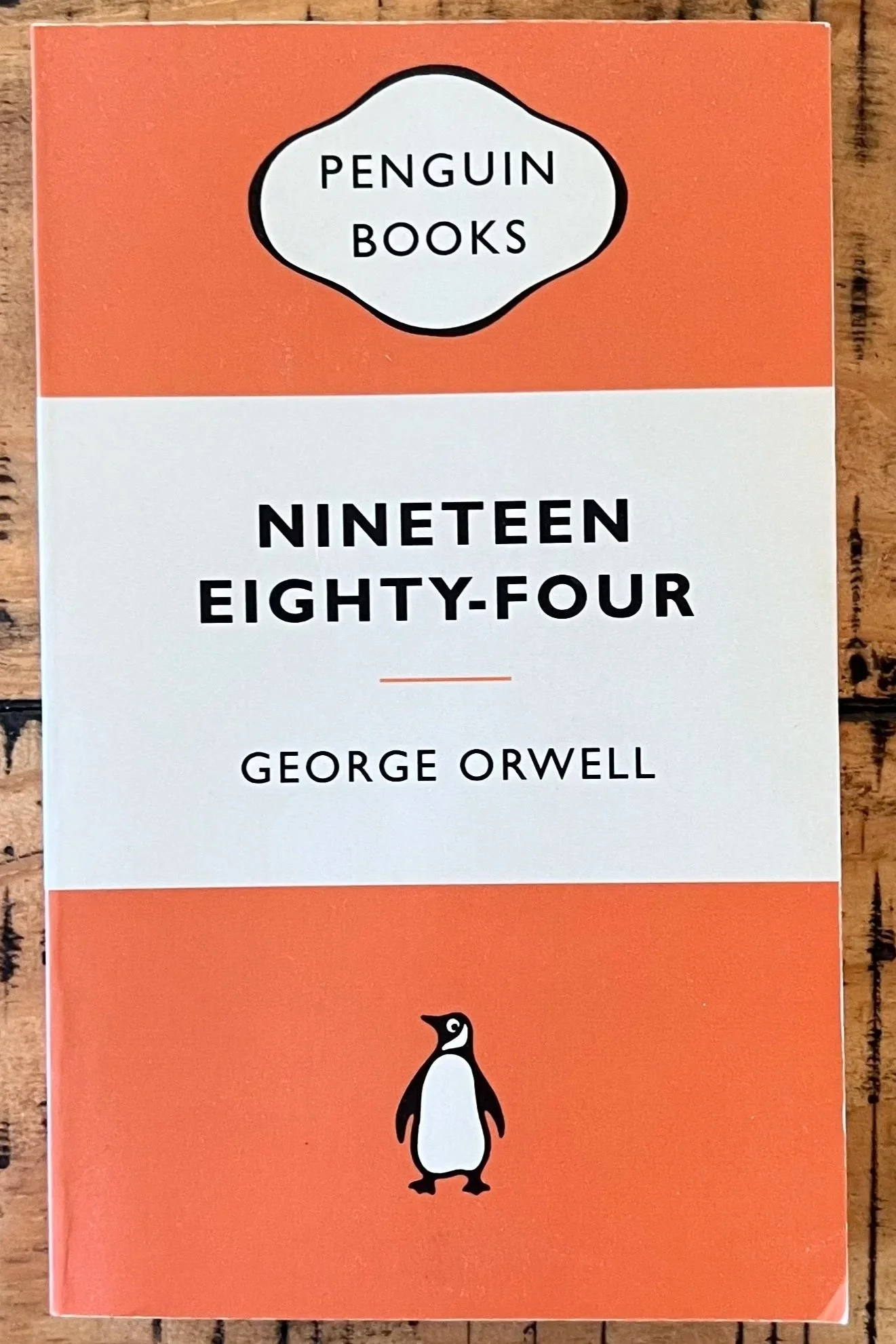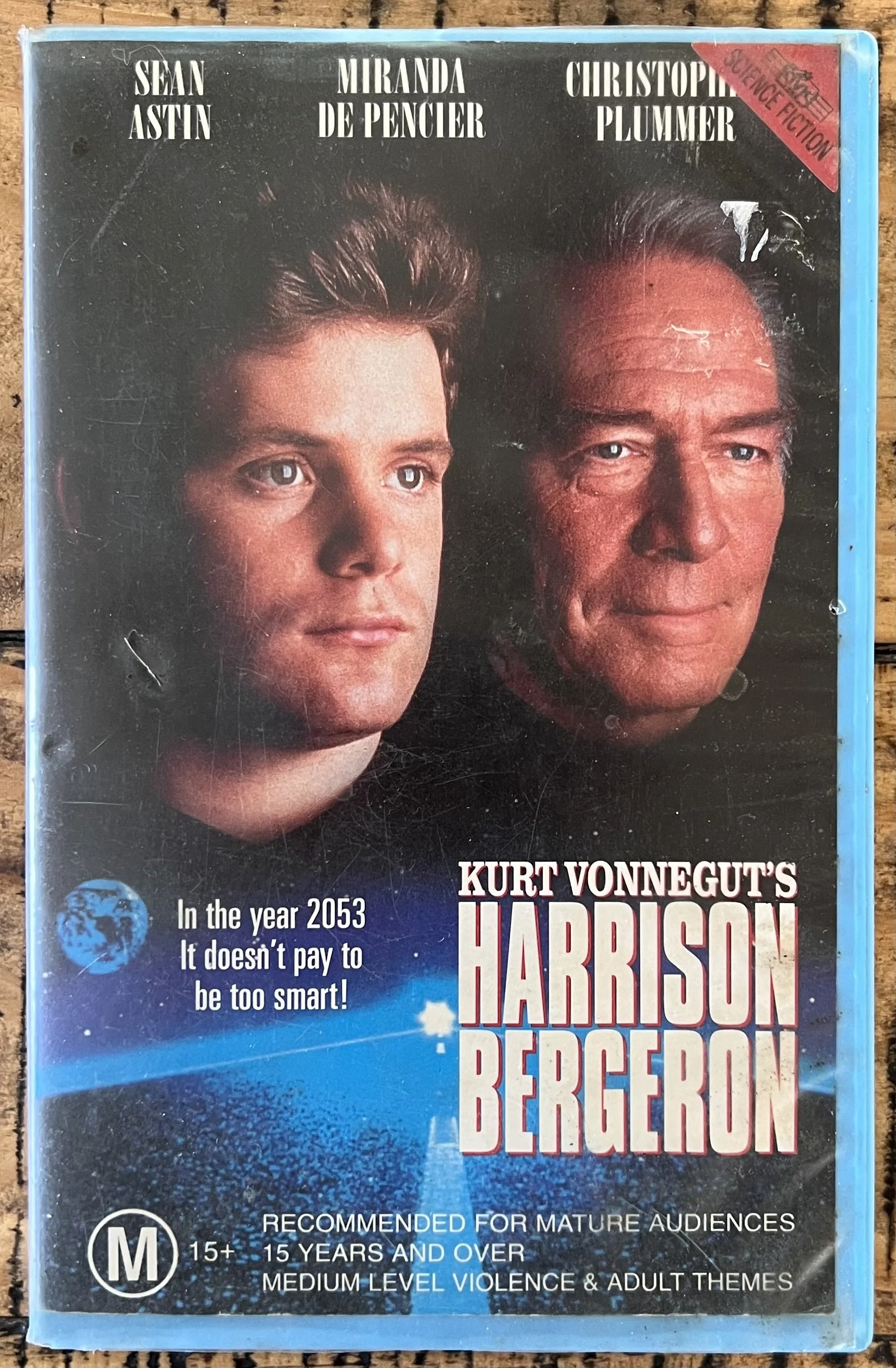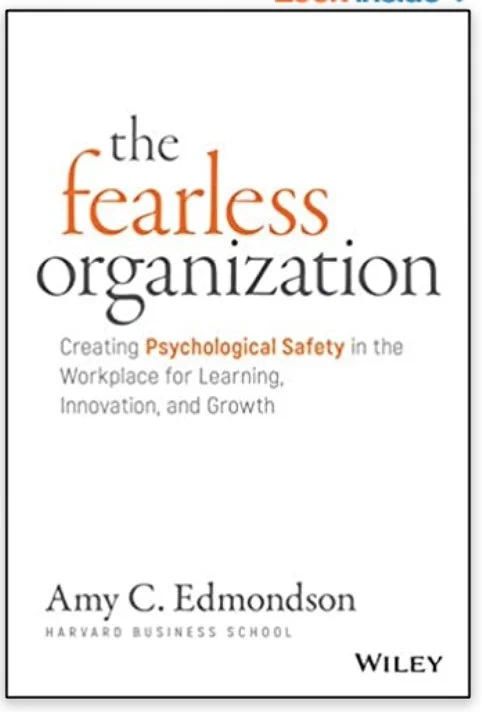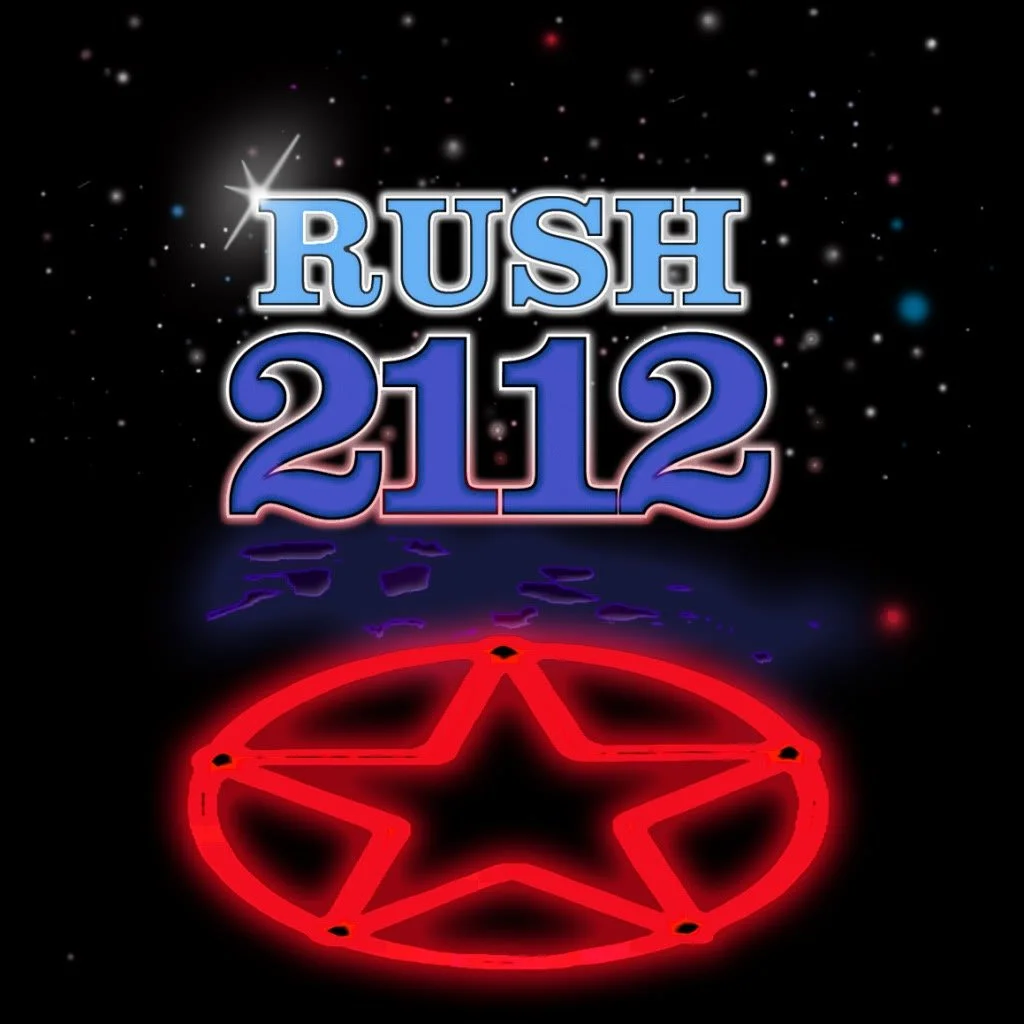human destructiveness
Influences on The Insightful Path
Each generation inherits its own version of a cage. Some are made of steel and surveillance. Others of comfort, conformity, or fear. But the empowering question is not really ‘who built the cage walls?’. The question that unlocks agency is ‘what do I have the ability to See, Do, and Change within my own experience of this?’
In effect, ‘what should I develop in order to regain that state where I can achieve purpose in my work and in my life?’
You may be feeling the pressure… those things that seem to control you, and demand a compliance with the unspoken ‘rules of conformity’. This post shares several influences, (authors and artists) that contributed to my thinking on this topic. Who they are, and their messages are as follows:
Huxley, who cautioned what befalls a world bent on consumerism and avoidance ;
Orwell, who warned of the malignant aggression of facsist ideas in society;
Vonnegut, who sarcastically laughed at a society of ‘forced equality’;
Rush, who indignantly encouraged defying the pressures to conform; and
Pink Floyd, who despaired about the absence of meaning that comes from compliance and conformity.
And I’ve interspersed this essay with other insights that support these claims - from research into psychology, leadership development, and sociology. I hope it resonates.
“Attune yourself. What does it feel like when the path you are on leads you to undesirable outcomes? What does it feel like when you acknowledge this, and take steps toward a more skilful outcome? Use these insights to build your own inner compass. And practice using this compass during your daily choices, and practices. ”
I don’t think these influences on my ideas were speaking of different things. Beneath the satire and sorrow, I think they were all pointing to the same wound … the slow erosion of the individual which takes place when society is carrying the weight of fear, distraction, and the enforce compliance and conformity.
When I think about how our ‘adaptation’ as a species is our ability to collaborate, this makes a sort of a perverse sense. In that the thing that helped us to survive in the days before global communities, were the behaviours that allowed us to protect our community and to swiftly spot threats, including those who were not a part of ‘our community’. Yet this very adaptation is now limiting our abilities where we are fast discovering how very interconnected we are as a species - and as nations and groups within them. Our predisposition for seeing negatives (threats) over opportunities, as outlined by Vaish, Grossmann, and Woodward is no longer serving us, and we’ve not yet habituated our collective thinking toward this insight. Nor have we really examined what of our culture gets in the way of innovation and empowerment.
This idea is not just mine. It is also supported by some evidence. Yale psychologist Neha Mahajan and colleagues in their studies on implicit bias found what they say, supports the idea that ‘prejudice’ evolved as an adaptive response to group living. Their analysis was that our human ancestors relied on groups for survival, and thus became vigilant toward outsiders who might bring them harm, competition, or disease. Over generations, this vigilance, they surmised, became unconscious and automatic, and can still be measured through implicit association tests, such as Harvards Project Implicit.
That instinct, once vital, now turns inward, shaping systems, cultures, and even our own habits of thought. We mistake safety for sameness, and harmony for homogeneity. We build walls not just around nations or identities, but around our own awareness.
One of my heroes, and deep influence is German-American social psychologist and author, Erich Fromm who called this the ‘anatomy of human destructiveness’. which he said came from what he called the ‘malignant aggression’ that is rooted in insecurity, fear, or alienation (as opposed to the aggression that arises to defend elements of survival).
And why this is relevant now? Because culturally, so many of us have been taught to neglect the nobler purposes of what Fromm calls ‘benign aggression’ which is the form of assertiveness that arises which is adaptive, protective, and proportionate.
Without us developing our ability to differentiate between benign andmalignant agression (domination, cruelty, and control), we are doomed to the latter.
Huxley and the excess that led to awakening
Aldous Huxley wrote Brave New World with his insights on the dangers of using pleasure as a means of control. The context may have been different to how this is used now, his being after the roaring 1920s, vs our time. However the ‘20s were a time of speed, indulgence, and the illusion that progress could outrun consequence. Not too dissimilar to now. For Huxley, when the Great Depression arrived, it was more than an economic collapse; it was a spiritual reckoning. He saw the dangers of a society too caught on pleasure and how this could be used to numb us to reality, and our ability for reflection… and through this, losing our individual identities (and the benefits that come from this) In a distracted world without grounding.
I’ve found it true in my own life that the lessons I’ve ignored, return, again and again, until we are ready to learn them. Unfortunately, it seems that we only truly become aware of the lesson, after we’ve found a compelling reason to learn it.
Orwell and the duty to remember
If Huxley warned of society numbing itself, George Orwell, in his novel ‘1984’ warned of this compliance being forced upon it. He had lived through totalitariansim, he fought in the Spanish Civil War, seen propaganda turn ideals into instruments of cruelty. He wrote to help us remember to be wary of the stages of totalitarianism. That when ‘truth’ becomes elastic, when language is reshaped to fit power, when silence becomes a survival strategy… that we are already standing in dystopia.
Orwell begged us to notice what has come before… to stay awake to cycles of fear and control that resurface in every era, and to consider if, and how this could happen on our own paths. Orwell’s 1984 was the gift of a moral compass disguised as fiction.
A great fairly modern examination of how we can see some of the techniques of the world Orwell feared would arise again, you can watch the 2002 BBC documentary title The Century of Self, in relation to how Sigmund Freud’s insights were used not for healing, but for controlling the populations. How psychological techniques to understand, and possibly create desires of the public could be used to then create solutions to those desires - be they products to sell for money, or ideas to exchange for loyalty, even if those ideas appeal to the more primitive impulses of the crowd.
2002 BBC documentary
The Century of Self
1995 Movie adaptation of Vonnegut’s Harrison Bergeron
Vonnegut and the absurdity of enforced sameness
Kurt Vonnegut’s short story Harrison Bergeron brought a tragicomic twist to the dystopia. In his world, everyone is ‘equal’ but only because the gifted are handicapped. The strong weighted down. The intelligent distracted. The beautiful masked. Those that stand out as having more potential than others, are forced into not realising this.
Vonnegut’s vision speaks directly to cultures of conformity, where we fear standing out. While this story was adapted into a movie in 1995 (I must admit my first introduction to the work), the original is more nuanced. A truer stage rendition of this is the 2009, short film 2081.
Modern author, Marianne Williamson, quoted by Nelson Mandella, shared her insight that ‘Our deepest fear’ is ‘not that we are inadequate’… but is actually scared of what it means if we achieve our full potential. Yet, Williamson encourages us to strive for our best self, for, as she says, ‘…as we let our own light shine, we unconsciously give other people permission to do the same’.
This may sound overly poetic, however it may be backed up by significant evidence. Research by Professor Amy Edmondson, on psychological safety (in her book, “The fearless organisation”, found that in organisations where it is safe to be included, to learn, to contribute your insights, and even challenge those of others, that these are the most successful.
‘2112’
RUSH’s 4th studio album, (1976)
Rush and the cry of creative defiance
By the 1970’s, the dystopian imagination had shifted from the pages of books to the stage of rock concerts. The Canadian rock band, Rush, in their ‘2112’ speak of this. They created this 20 minute sci-fi rock anthem as a way to talk about totalitarianism and the pressures to simply comply, to be ‘useful’, rather than being able to follow (let alone connect with) an inner sense of purpose.
‘We’ve taken care of everything, the words you hear, the songs you sing. The pictures that give pleasure to your eyes’
The song speaks of a time where music and individuality are banned, one man rediscovers an ancient guitar and rails against the established belief that society must enforce compliance and artistic expression, for all its power to do good, must be contained. And yet, Rush, and the character within 2112, hoped that his singing could reignite the memory of what it means to be human.
‘ I wandered home, through the silent streets, and fell into a fitful sleep. Escape to realms beyond the night, dream, can’t you show me the light? I see the hand of man arise, with hungry mind, and open eyes.’
As an artist, Rush’s message speaks to me. It says, ‘To Create Is To Resist’. The act of insight, of seeing something new, and trying to bring hope and change through these insights, is itself a rebellion against the numbing systems around us. Each small creative act you can do, each conscious choice you make, is a step that brings us all that much further away from dystopia.
‘The Wall’: Pink Floyd (1979)
The Wall, and The myth of freedom
With their 1979 album, The Wall, English rock band Pink Floyd, internalised the dystopia entirely. The prison is no longer a regime but the architecture of the psyche. Drawing on Erich Fromm’s Escape from Freedom, the album reveals the paradox that we often flee from our own liberation, seeking safety in the very walls that isolate us.
For many leaders and professionals, these walls are invisible: perfectionism, control, the armour of expertise. We build them to protect ourselves and then wonder why connection feels so distant. Freedom demands vulnerability, and this is where insight begins.
What does this mean?
Across Huxley, Orwell, Vonnegut, Rush, and Floyd runs an interesting evolutionary current: and the realisation that restrictions (be they political, cultural, national, or organisational) which impede one’s freedoms… that these restrictions create societies that are oppressive. Yet, and this is important, we can look to see where these restrictions are, even if this means they exist in our own world views, and we can then critically think on whether they help or hinder our ability to meet our purpose and thus thrive.
The deeper irony (and opportunity) is that the same awareness that can see ‘the cage’ of conformity and compliance (and even totalitarianism), can also ‘unlock it’.
Insight isn’t an intellectual exercise; it’s a daily discipline.
It’s the art of noticing our own participation in the systems we blame and in the challenges we face. This is not about blame, it is about identifying what in our experience we can use to help us to meet the objectives which will enable us to thrive.
When we build that awareness (in ourselves, our teams, our leadership) we begin to reclaim choice and regain self-agency on the path toward conscious leadership.
The breath of reflection
So perhaps the question is not ‘how do we prevent dystopia?’, but ‘how do we unlearn the habits that sustain it?’
Every time we choose reflection over reaction, dialogue over dominance, creativity over compliance, we step outside the system that controls us.
This is where coaching can come in: helping people build the capacity for awareness that transforms how they act, lead, and live. It’s how we turn walls into windows. You may ask yourself:
Where in your work or life do you see elements of one of these dystopian works’?
What would noticing (truly noticing) this… change for you?
What small creative act could you take today that reaffirms your own freedom in relation to what you see?
If this exploration resonated with you, its the kind of work I help leaders and professionals do thorough Insightful Path. We don’t fight the paths we are on, we learn to navigate our journey with more awareness.
What insights await on your path?
If this piece stirred something in you, a sense that the ‘walls’ around your leadership, your creativity, or your life might be thinner than they appear, then perhaps it’s time to explore that space with support. Perhaps with some space, you can shift your attention from the walls to how to build your inner ability to reclaim your freedom.
At Insightful Path, my coaching helps people do exactly this. They report that after coaching they notice more deeply, lead more authentically, and are able to reclaim the creative freedom that’s already theirs.
You don’t need to tear the whole system down to be free. You just need to begin noticing where the light gets in. Reach out today!

